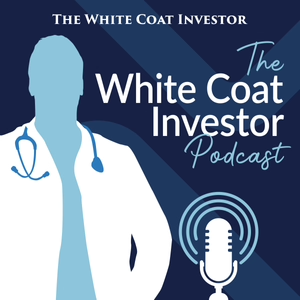
Year-End Tax & Investing Tips. No Dumb Questions with Connell McShane and Doug Flynn, CFP. Ep. 5
12/09/24 • 29 min
Connell and Doug discussed year-end tax planning strategies, including the benefits of selling off "losers" in investment portfolios to save on taxes and setting up a self-employed retirement plan. They also emphasized the importance of considering tax implications when making investment decisions, such as selling stocks with gains to offset losses. Additionally, they discussed the tax implications of gifting money to family members and the potential benefits of prepaying property taxes.
Year-End Tax Planning Strategies
In this episode of the podcast, Connell and Doug discuss year-end tax planning strategies. They emphasize the importance of considering 401(k) contributions, especially for those receiving year-end bonuses or extra taxable income. They also discuss the benefits of setting up a self-employed retirement plan, such as an individual 401(k), before the end of the year. Additionally, they advise on selling off "losers" in investment portfolios to save on taxes and taking inventory of one's portfolio. They caution against the 30-day "wash sale rule" when selling securities.
Managing Investments and Tax Implications
Doug and Connell discussed strategies for managing investments and tax implications. Doug explained the process of offsetting losses against gains, and the possibility of carrying over losses to future years. He also highlighted the importance of recognizing and booking losses, particularly in cases of worthless securities. Doug further discussed the strategy of selling stocks with gains to offset losses, allowing for a reset of the cost basis and potentially lower future tax liabilities. Connell agreed with Doug's points and emphasized the importance of considering tax implications when making investment decisions.
Year-End Tax Strategies and Giving
Doug and Connell discussed year-end tax strategies, focusing on capital gains tax treatment, selling gains against losses, and bunching up deductible expenses. Doug emphasized the importance of consulting with an advisor before the end of the year to optimize tax benefits. They also touched on the topic of charitable giving, with Doug noting that people are motivated by tax breaks, but also suggesting that giving to charity should be done regardless of tax benefits. Lastly, they briefly discussed the gift tax limit and its implications for giving away assets during the year-end.
Tax Implications of Family Gifts
Doug and Connell discussed the tax implications of gifting money to family members. Doug explained that each person can gift up to $18,000 per year without filing a gift tax return, and the husband and wife can each give this amount to their children. Doug also advised that gifts should be made in cash to avoid potential tax issues. Connell agreed, noting that while the tax implications may not be significant for most people, it's still important to consider them. Doug also suggested that new homeowners could potentially prepay their property taxes to take advantage of the tax deduction in the current year.
Podcast Success and Tax Tips
Connell and Doug discussed the success of their podcast, particularly the latest episode which they found to be their best yet. They emphasized the importance of considering tax implications when making financial decisions, such as buying a house. They also encouraged listeners to leave comments with future podcast topic suggestions. They mentioned that they will be posting about the podcast on various platforms and that tax tips will be featured in upcoming episodes.
Follow us:
Connell McShane
X @ConnellMcShane
IG @ConnellMcShane
YT @ConnellMcShane
Doug Flynn
X @FlynnZito
IG @DougCFP
YT @FlynnZito
Connell and Doug discussed year-end tax planning strategies, including the benefits of selling off "losers" in investment portfolios to save on taxes and setting up a self-employed retirement plan. They also emphasized the importance of considering tax implications when making investment decisions, such as selling stocks with gains to offset losses. Additionally, they discussed the tax implications of gifting money to family members and the potential benefits of prepaying property taxes.
Year-End Tax Planning Strategies
In this episode of the podcast, Connell and Doug discuss year-end tax planning strategies. They emphasize the importance of considering 401(k) contributions, especially for those receiving year-end bonuses or extra taxable income. They also discuss the benefits of setting up a self-employed retirement plan, such as an individual 401(k), before the end of the year. Additionally, they advise on selling off "losers" in investment portfolios to save on taxes and taking inventory of one's portfolio. They caution against the 30-day "wash sale rule" when selling securities.
Managing Investments and Tax Implications
Doug and Connell discussed strategies for managing investments and tax implications. Doug explained the process of offsetting losses against gains, and the possibility of carrying over losses to future years. He also highlighted the importance of recognizing and booking losses, particularly in cases of worthless securities. Doug further discussed the strategy of selling stocks with gains to offset losses, allowing for a reset of the cost basis and potentially lower future tax liabilities. Connell agreed with Doug's points and emphasized the importance of considering tax implications when making investment decisions.
Year-End Tax Strategies and Giving
Doug and Connell discussed year-end tax strategies, focusing on capital gains tax treatment, selling gains against losses, and bunching up deductible expenses. Doug emphasized the importance of consulting with an advisor before the end of the year to optimize tax benefits. They also touched on the topic of charitable giving, with Doug noting that people are motivated by tax breaks, but also suggesting that giving to charity should be done regardless of tax benefits. Lastly, they briefly discussed the gift tax limit and its implications for giving away assets during the year-end.
Tax Implications of Family Gifts
Doug and Connell discussed the tax implications of gifting money to family members. Doug explained that each person can gift up to $18,000 per year without filing a gift tax return, and the husband and wife can each give this amount to their children. Doug also advised that gifts should be made in cash to avoid potential tax issues. Connell agreed, noting that while the tax implications may not be significant for most people, it's still important to consider them. Doug also suggested that new homeowners could potentially prepay their property taxes to take advantage of the tax deduction in the current year.
Podcast Success and Tax Tips
Connell and Doug discussed the success of their podcast, particularly the latest episode which they found to be their best yet. They emphasized the importance of considering tax implications when making financial decisions, such as buying a house. They also encouraged listeners to leave comments with future podcast topic suggestions. They mentioned that they will be posting about the podcast on various platforms and that tax tips will be featured in upcoming episodes.
Follow us:
Connell McShane
X @ConnellMcShane
IG @ConnellMcShane
YT @ConnellMcShane
Doug Flynn
X @FlynnZito
IG @DougCFP
YT @FlynnZito
Previous Episode

Trump 2.0 and Your Money: Investing during the Trump Presidency. No Dumb Questions with Connell McShane and Doug Flynn, CFP. Ep. 4
Connell and Doug discuss the potential impact of Donald Trump's presidency on the stock market and the economy, including the effects of lower corporate tax rates and tariffs.
Trump's Presidency and Economic Impact
Doug suggested that Trump's administration might lead to less regulation in energy and financial sectors, which could result in increased mergers and acquisitions. He also noted that the economy is in good shape, with the consumer being a significant contributor. However, Doug acknowledged the risk of going too far with business-friendly policies, which could lead to unnecessary risks and potential economic dangers. They also discussed the potential impact of Trump's proposed corporate tax rate of 15%, which could be a significant factor in the economy.
Corporate Tax Rates and Earnings
Doug discussed the potential impact of lowering corporate tax rates on company earnings and stock market valuations. He suggested that a lower tax rate could lead to increased earnings and potentially higher stock prices, making the market more fairly valued. Doug also emphasized the importance of considering the domestic revenue of companies when assessing their potential for growth. He used Walmart as an example, noting that 68.2% of its revenue is from the US. Doug also discussed the potential for onshoring due to tariffs, suggesting that this could benefit smaller companies with a higher US presence. However, he acknowledged that there might be short-term negative impacts from tariffs, such as higher inflation and a temporary hit to GDP.
Tariffs, Politics, and Economic Implications
Doug and Connell discussed the potential impact of tariffs on their company's profitability and the overall US economy. Doug suggested that while the tariffs might slightly increase costs, the long-term benefits of keeping production in the US could outweigh these costs. They also discussed the implications of the recent change in the US political landscape, with the GOP now controlling both the White House and Congress. Connell expressed concern about the potential for the GOP to go too far with their policies, leading to a ballooning deficit. Doug noted that the highest percentage of promised legislation ever passed was 8%, and that any significant increase could lead to extreme policies. They concluded by speculating on the potential for extending tax cuts, which Connell believed the GOP would support.
Tax Cuts and Bond Market Impacts
Doug discussed the impact of tax cuts on the middle income spectrum, noting that most people now file with the standard deduction due to the increased standard deduction amount. He also mentioned the potential for economic growth and the need for smaller government to control deficits. Connell then shifted the discussion to the bond market, asking about the implications of Trump's policies on bonds. Doug explained that short-term interest rates may remain higher due to anticipated higher inflation, but could eventually decrease. He suggested that a safer investment strategy in the current market is to stay shorter term on the yield curve.
Tax-Free Bonds and Economic Growth
Connell and Doug discussed the current economic situation and the potential for growth. Doug emphasized the benefits of tax-free bonds for those in higher tax brackets, highlighting their potential for high after-tax effective yields. He also expressed optimism about the economy, noting that the market is anticipating positive changes. Doug agreed to participate in a longer discussion on financial literacy topics in future episodes of their podcast.
Follow us:
Connell McShane
X @ConnellMcShane
IG @ConnellMcShane
YT @ConnellMcShane
Doug Flynn
X @FlynnZito
IG @DougCFP
YT @FlynnZito
Next Episode

401(k)s: Your Biggest Investment Asset. What You Need To Know. No Dumb Questions with Connell McShane and Doug Flynn, CFP. Ep. 6
Connell and Doug discussed the importance of early retirement planning, particularly through 401(k) plans, and the allocation of money in retirement plans. They also explored the challenges of retirement planning, comparing pensions and 401(k)s, and suggested ways to replicate a pension through investing. The conversation concluded with a discussion on the importance of self-reliance and having a plan for retirement.
Retirement Savings by Generation
In this episode of the podcast, Connell and Doug discuss retirement savings and how different generations approach the topic. They note that the way one thinks about retirement largely depends on their generation, with older generations like the boomers relying more on pensions and younger generations like millennials and Gen. Z focusing more on 401(k)s. The younger generations are also more likely to believe they will rely on their children or relatives for financial support in retirement. Connell and Doug emphasize the importance of self-reliance and early planning for retirement savings, especially for younger generations.
Early Retirement Planning and Roth 401(k)
Doug and Connell discussed the importance of early retirement planning, particularly through 401(k) plans. Doug emphasized the benefits of starting early, citing an example of someone who starts saving at age 22 and ends up with a significantly larger retirement fund by age 67. He also highlighted the advantage of the Roth 401(k) option, which allows for tax-free growth, as opposed to the traditional 401(k) which defers taxes until withdrawal. Connell agreed, noting that the Roth option is often overlooked but can be beneficial, especially considering the uncertainty of future tax rates.
Retirement Plan Allocation and Options
Connell and Doug discussed the allocation of money in retirement plans, particularly for younger individuals. Doug explained the concept of target date funds, which adjust their investment mix based on the investor's age, and recommended automatic rebalancing for those with multiple funds. He also suggested that individuals with more than $100,000 in their 401(k) might benefit from rolling over their funds to an IRA for greater investment options. Connell expressed regret over not taking more control over his retirement funds earlier. The conversation ended with a discussion on whether the current retirement system is working effectively.
Retirement Planning Challenges and Solutions
Connell and Doug discussed the challenges of retirement planning, particularly in the context of pensions and 401(k)s. They noted that pensions, while providing a fixed income, often do not keep pace with inflation and may not cover all expenses. In contrast, 401(k)s offer more flexibility but require individuals to manage their own retirement income. Doug suggested that individuals could potentially replicate a pension by investing a portion of their 401(k) in an annuity, providing a guaranteed income for life. Connell agreed, emphasizing the importance of having a plan for retirement and managing one's own finances. They ended the conversation by wishing everyone a happy holiday season and looking forward to their next meeting.
Follow us:
Connell McShane
X @ConnellMcShane
IG @ConnellMcShane
YT @ConnellMcShane
Doug Flynn
X @FlynnZito
IG @DougCFP
YT @FlynnZito
If you like this episode you’ll love
Episode Comments
Generate a badge
Get a badge for your website that links back to this episode
<a href="https://goodpods.com/podcasts/no-dumb-questions-with-connell-mcshane-and-doug-flynn-cfp-587998/year-end-tax-and-investing-tips-no-dumb-questions-with-connell-mcshane-79907882"> <img src="https://storage.googleapis.com/goodpods-images-bucket/badges/generic-badge-1.svg" alt="listen to year-end tax & investing tips. no dumb questions with connell mcshane and doug flynn, cfp. ep. 5 on goodpods" style="width: 225px" /> </a>
Copy




